Armenia hosts Youth Policy Symposium with EECA countries
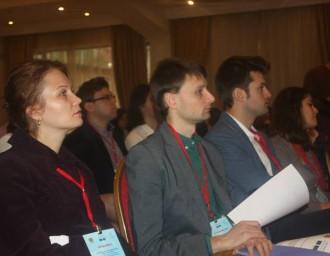
Role of youth work in education for democratic citizenship and participation is high on the agenda at the symposium held in Yerevan these days.
On November 13-14 about 50 stakeholders gathered in the Armenian capital for a two-day Youth Policy Symposium with Eastern European and Caucasus countries 2013. The participants come from different countries of the region, including national governmental authorities in charge of youth and education, youth workers and youth leaders with interest and experience in the topic, as well as representatives of local authorities, researchers and other relevant stakeholders.
The Symposium is aimed atbetter understanding, as well as exemplifying and promoting the role of youth work in education for democratic citizenship and participation. Among the objectives of the conference are initiation of dialogues, discussions, debates, exchanges and possible co-operations among all stakeholders; creation of opportunities for peer-learning and presentation of good practices. Accordingly, the Symposium is basically trying to establish links between youth policy, research and practice with the help of cross-cultural interaction, innovation and technologies.
The conference was opened by Arsen Karamyan, Deputy Minister of Sport and Youth Affairs of Armenia. In his welcoming speech he emphasized that the event followed the symposium on Youth Policy Cooperation in the EECA region in 2011 and the symposium on youth policy and health and well-being of young people in the EECA region in 2012. Traian Hristea, the Head of EU Delegation to Armenia, took up his words and noticed the continuity of the symposium and its place within the series of workshops on youth policy development in Eastern Europe and the Caucasus. He also mentioned that the event “brought together policy makers, youth researchers and youth workers to develop common solutions and network across the borders to promote youth work in education for democratic citizenship and participation”.
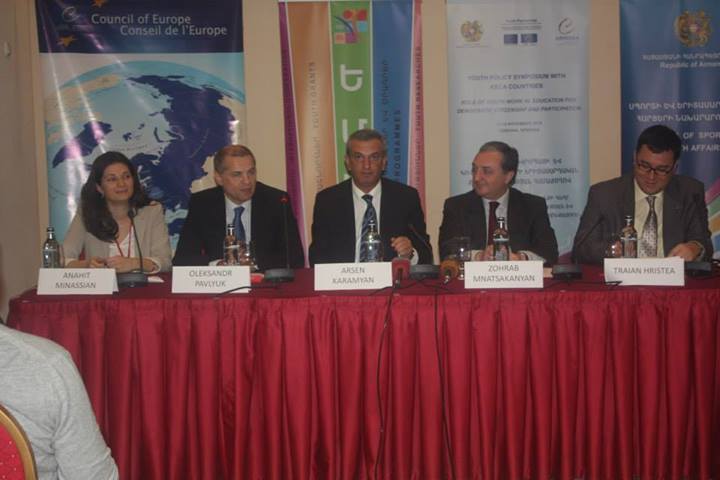
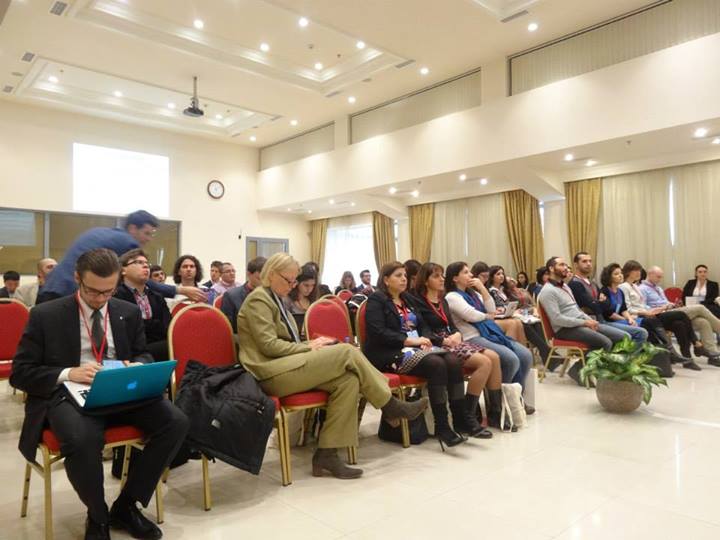
According to Oleksandr Pavlyuk, the Head of the Council of Europe Office in Yerevan, current Armenian chairmanship in the EU Council is rather successful, as “it managed to bring into Armenia a debate and dialog, and actually made Armenia a part of the European dialog”. Oleksandr Pavlyuk also emphasized high significance of the topic the symposium is focused on: “The Council of Europe’s Charter on Education for Democratic Citizenship and Human Rights Education 2010 calls on membership countries to provide better opportunities of education for democratic citizenship and human rights education for young people”, - he reminded.
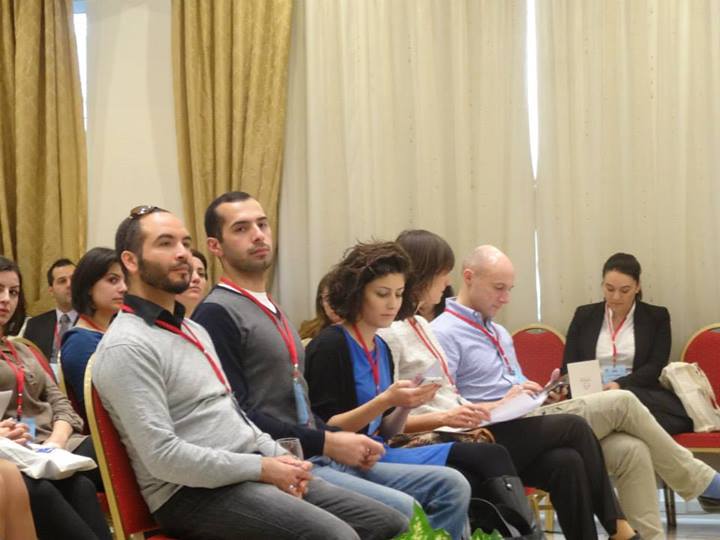
After the opening addresses brief presentation of the program followed. Being youth-focused event, the Symposium introduced non-formal means of presenting the program of the Symposium, which, apart from everything else, enabled the participants to discover Armenia, said Anahit Minassian, the reporter and facilitator, introducing the agenda of the Symposium.
.jpg)
![]()
The historical prospective was touched upon by David Hayrapetyan, the Director at Youth events holding center SNCO, who introduced the participants to the Armenian experience of government-NGO collaboration, as well as mentioned the signing of the Concept of State Youth Policy of Republic of Armenia in 1998. This conception determines the basic provisions and directions based on which the State Youth Policy of Armenia is developed and implemented.
David Hayrapetyan also talked about three challenges Armenian state youth policy faces now: increasing the recognition level of non-formal education and synthesis of formal and informal education, improvement of state grants competitions and making it more targeted, and State Youth Policy Concept development.
![]()
.jpg)
![]()
Areg Tadevosyan from the International Center for Intercultural Research presented the results of a detailed research on youth work and participation within the countries of an Eastern Partnership program except Azerbaijan. The research was implemented through the mechanisms such as National Reporters, National Check-up, and a Synthetic report on EECA. The expert described the follow-up of this research as “quite productive, as some recommendations are addressed by the government, even if there are few”.
The issues addressed in this research consider Belarus both as good example and as a “victim” of the need for improvement, which is required for the whole region. Some civil servants trainings organized in Belarus, as well as festivals of non-formal education organized in Belarus since 2006, served as an example of productive sharing practices within the EECA region. Youth work it is not recognized officially in none of the countries in the region, Areg Tadevosyan mentioned. However, there are some improvements; and State Institute of Advanced Studies And Retraining in Belarus that founded a special study course for youth workers vividly demonstrates the progress in this sphere.
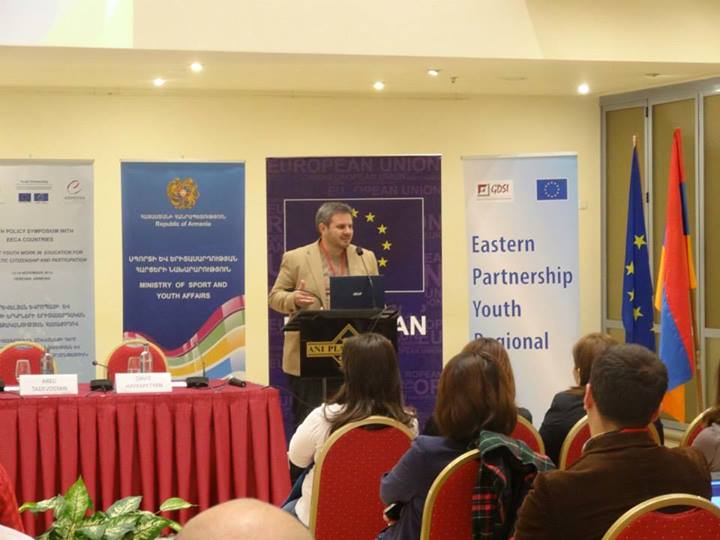
![]()
The Youth Policy Symposium with EECA countries continued with the panel discussion that dealt with the role of youth work in education for democratic citizenship and participation.
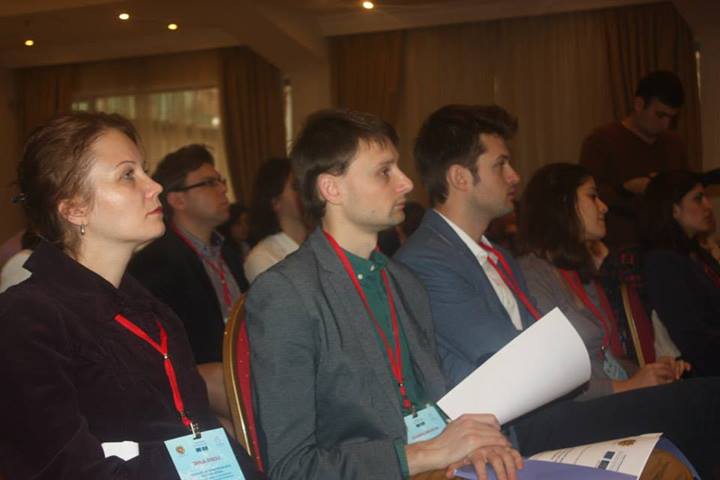
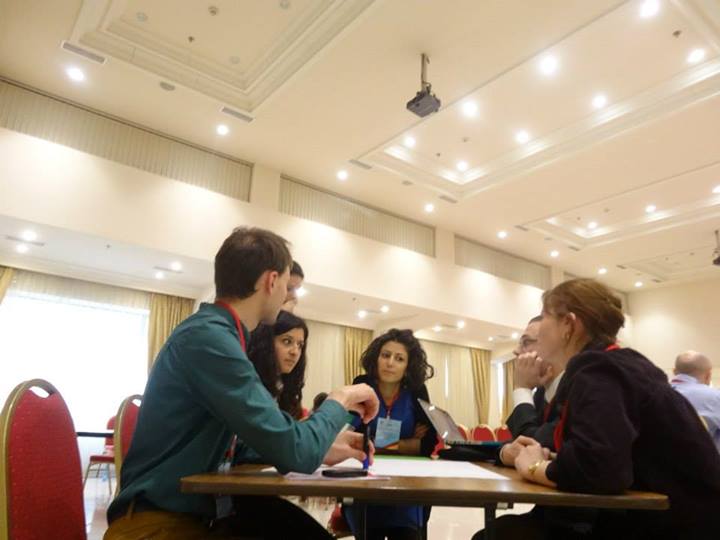
![]()
![]()
On a second day of the Youth Policy Symposium with EECA coutries quite a lot of time is allocated for the discussions and exchange of experience between the participants of the event. A visit to an example of a youth work project in Armenia is scheduled for the first part of the day; whereas the time in the afternoon is allotted to panel discussion on the status and recognition of youth work and its links with policy, an open session for the stakeholders and a final plenary session that will sum up the results of the conference.
-
03.01
-
07.10
-
22.09
-
17.08
-
12.08
-
30.09



























